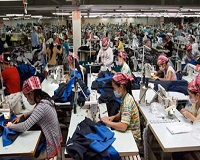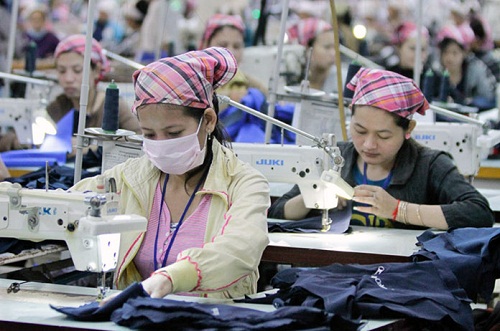"Though, a recent survey by UN initiative Better Factories Cambodia (BFC) indicates improving conditions in the country’s garment factories, human rights violations demand new mechanisms for accountability and transparency in these companies. Hun Sen government and the international race to search the cheapest labor, have created an economy that forces Cambodians, especially women, to rely on these low-paying jobs that still expose them to rights violations.It’s crucial that the government, garment industry corporations and international allies support the Cambodian people in pushing for transparency, accountability and better conditions."
 Though, a recent survey by UN initiative Better Factories Cambodia (BFC) indicates improving conditions in the country’s garment factories, human rights violations demand new mechanisms for accountability and transparency in these companies.
Though, a recent survey by UN initiative Better Factories Cambodia (BFC) indicates improving conditions in the country’s garment factories, human rights violations demand new mechanisms for accountability and transparency in these companies.
Hun Sen government and the international race to search the cheapest labor, have created an economy that forces Cambodians, especially women, to rely on these low-paying jobs that still expose them to rights violations.It’s crucial that the government, garment industry corporations and international allies support the Cambodian people in pushing for transparency, accountability and better conditions.
Compliance improves, violations continue to exist
The BFC report found improved compliance for international laws around overtime wages, discriminations against employees, child labor, routine evacuation drills, and reprisals for union membership.
However, across the nearly 500 factories surveyed, still 234 violations wereregistered between November 2017 and May 2018. According to Cambodian government’s own statistics, over 2,000 workers fainted in 2018 in just 16 factories that were surveyed. In one shoe factory in October, nearly 100 workers fainted during a single shift.
The survey also found only 11 violations of international child labor laws among 600,000 workers, far fewer than the 74 violations found in 2014. But there’s a good chance that children have simply stopped working in licensed factories, working at home or with subcontractors instead. Also,it’s possible that many children are now passing the age checks unnoticed.
that children have simply stopped working in licensed factories, working at home or with subcontractors instead. Also,it’s possible that many children are now passing the age checks unnoticed.
Some of the improvements that supposedly represent progress aren’t much cause for celebration. According to new recommendations, pregnant women are now allowed to leave work 15 minutes early and are given a benefit of 400,000 Riel (about $100) for having a single child. These concessions may signal improving conditions, but they also demonstrate severe gender-based discrimination.
Recent data from the World Bank suggests that demand for Cambodia’s exported textiles is increasing at a rate of 16.1 per cent per year, more than double that of the country’s economic growth rate.
Growth is partly due to the European Union’s decision to give Cambodia tariff-free access to their markets under the “Everything but Arms” (EBA) program. TheUnion has begun a six-month review of Cambodia’s trade status that will determine if they can continue trade within the EBA program.
Time to be accountable
Despite rights violations in the garment industry and the country as a whole, Nike, Adidas, H&M, Gap Inc, and other international brands continue to rely on Cambodia for the manufacture of a significant portion of their products.
H&M recently hosted a summit on fair wages in Phnom Penh and stated that wages for factory workers producing their clothing were 24 per cent higher than the minimum wage, for a total of $210.80 per month. However, Clean Clothes Campaign, a network that has been advocating for garment sector reform for 30 years, highlighted H&M’s failure to follow through on its promise to provide minimum wages to its 850,000 garment workers.
Hun Sen and his government appear content to allow the Cambodian economy to rely on this single industry, as they have for over two decades. It is upto international government and textile companies to shake them out of this slumber and advocate for a meaningful change in the country.












